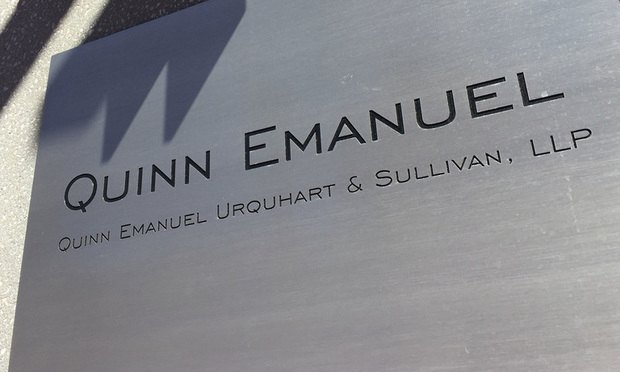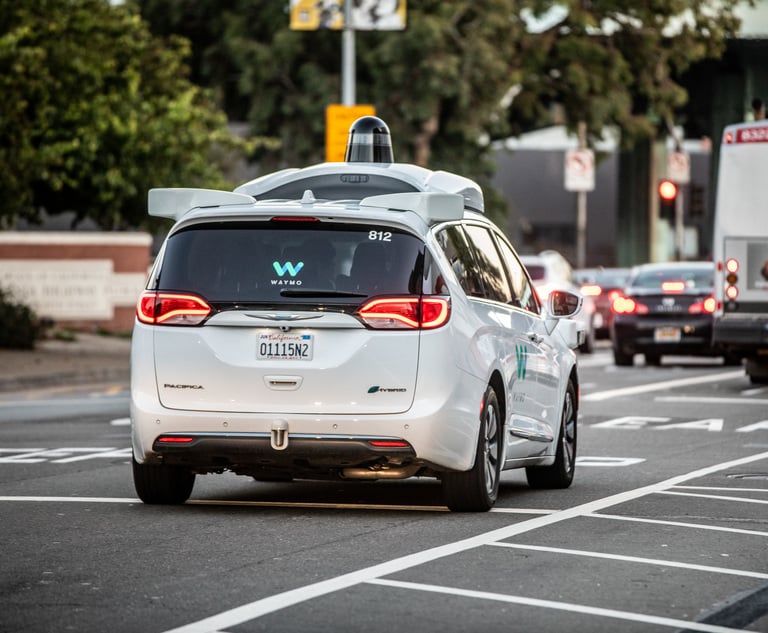'Massively Spoliated': Judge Issues Terminating Sanctions in Fight over Self-Driving Cars
The fight between WeRide and AllRide, who are competing to bring self-driving cars to the Chinese market, stands out for what U.S. District Judge Edward Davila of the Northern District of California described as a "staggering" amount of destruction of potentially discoverable material.
April 26, 2020 at 11:13 PM
6 minute read
The original version of this story was published on Litigation Daily
 Pick your metaphor: Head-on collision. Blowout. Crash and burn.
Pick your metaphor: Head-on collision. Blowout. Crash and burn.
In a decision made public on Friday, a federal judge issued terminating sanctions against Greenberg Traurig client AllRide for what he termed "massively spoliated" evidence in a brutal trade secrets fight between two autonomous vehicle companies.
Driving away with the win? A Quinn Emanuel Urquhart & Sullivan team led by Claude Stern and Ryan Landes for client WeRide. All that's left to be determined are damages and attorneys' fees.
It's one in a series of autonomous vehicle trade secrets cases that have been flaring up in Silicon Valley of late—conflict that's not entirely surprising, given the race to develop self-driving technology and the potentially enormous payoff for the first company to nail it (not to mention mobile employees who seem perfectly willing to change jobs).
 For example, earlier this month, self-driving car start-up Zoox Inc. reached a settlement with Tesla for an undisclosed amount, admitting that "certain of its new hires from Tesla were in possession of Tesla documents." Tesla has also sued another ex-employee who decamped for Xiaopeng Motors Technology Co., alleging that he uploaded "complete copies of Tesla's Autopilot-related source code to his personal iCloud account" before he quit.
For example, earlier this month, self-driving car start-up Zoox Inc. reached a settlement with Tesla for an undisclosed amount, admitting that "certain of its new hires from Tesla were in possession of Tesla documents." Tesla has also sued another ex-employee who decamped for Xiaopeng Motors Technology Co., alleging that he uploaded "complete copies of Tesla's Autopilot-related source code to his personal iCloud account" before he quit.
And in March, engineer Anthony Levandowski, the former head of Google's autonomous vehicle unit, agreed to plead guilty to federal trade secret theft after he jumped to Uber.
But the fight between WeRide and AllRide, who are competing to bring self-driving cars to the Chinese market, stands out for what U.S. District Judge Edward Davila of the Northern District of California described as a "staggering" amount of destruction of potentially discoverable material.
In a 32-page decision issuing terminating sanctions made public on Friday, Davila wrote that a less drastic punishment "would be futile."
"AllRide's mass destruction of email has irredeemably prejudiced WeRide's case against AllRide," the judge found. "AllRide's conduct demonstrates both willfulness and bad faith."
According to the docket report, AllRide is represented Greenberg Traurig lawyers including partner Kurt Kappes, who co-chairs the firm's labor and employment practice's complex employment litigation and trials group, as well as Jeffrey Greene, co-chair of the firm's global eDiscovery & eRetention practice.
Kappes did not respond to a request for comment.
The terminating sanctions also apply to the individual defendants—Jing Wang, who is WeRide's ex-CEO—and Kun Huang, WeRide's former head of hardware technology. The parties are jointly and severally liable.
Wang is represented by Kilpatrick Townsend lawyers including Gregory Gilchrist, the managing partner of the firm's San Francisco office, and Huang is represented by Mortimer Hartwell of Vinson & Elkins.
Neither counsel responded to a request for comment
According to the complaint, Wang on January 31, 2018 resigned as CEO of WeRide, a Sunnyvale, California-based company that claims to have invested at least $45 million to develop proprietary software capable of guiding driverless cars on public roads.
When Wang exited, he signed a separation agreement that barred him from disparaging WeRide. He also pledged that he "would not disclose any information he learned while at WeRide and that he would not solicit WeRide employees for one year after his separation," according to the complaint.
Spoiler alert: He allegedly broke all three promises.
The Quinn Emanuel team alleged that Wang promptly founded competitor AllRide and began recruiting WeRide employees, including Huang. According to the complaint, Huang downloaded over eight gigabytes of WeRide's data before he jumped to AllRide.
Wang also allegedly "contacted WeRide's investors and made a number of false statements," telling them things like "WeRide's technology did not work, its demonstration videos were faked, and its cars had been involved in an accident that WeRide was trying to cover up," the Quinn Emanuel team wrote.
WeRide claims to have lost over $75 million of committed investments as a result.
AllRide responded that WeRide failed to present "sufficient evidence demonstrating: (1) the existence of a viable trade secret, (2) that plaintiffs' alleged trade secrets derive economic value from not being readily ascertainable through proper means, (3) that [the defendant companies] acquired, used, or disclosed any of plaintiffs' alleged trade secrets."
So far, it sounds pretty much like a standard trade secrets fight. Where it went off the rails was in discovery. Because as we all know, sometimes, it's the cover-up, not the crime.
Months after the litigation had begun—and after a preliminary injunction had been issued—AllRide told the court that (oops) it "had not turned off an auto-delete setting on the company's email server leading to the company-wide destruction of emails," Davila wrote. The auto-delete zapped all emails more than 90 days old.
So…on one hand, who hasn't forgotten to turn off their out-of-office notice after they get back from vacation?
But we're talking here about all of AllRide's emails from its founding in June or July 2018 through March 2019. Also, AllRide revealed separately that several individual email accounts associated with Huang, Wang and Wang's wife had been destroyed.
That's not all. According to the Quinn Emanuel team, Huang "wiped files from two laptops, destroyed a third, spoliated code files on a fourth, and 'lost' two additional USB drives, cutting off all efforts to trace files from WeRide."
Moreover, the plaintiffs argued, it will be impossible to determine if AllRide used WeRide's code "because AllRide has produced, and intends to rely on, false code that contradicts the testimony of its own corporate representative, and destroyed weekly engineering reports and countless other contemporaneous documents that could have shown the actual course of code development."
Davila was persuaded.
"The public policy favoring disposition of cases on their merits … usually weighs against terminating sanctions," he wrote. "Here, the court finds that the prejudice to WeRide is so great that it outweighs this factor. AllRide's destruction of evidence was so sweeping that this case cannot be resolved on its merits."
We hope you enjoyed this excerpt from Litigation Daily, the exclusive source for sharp commentary on mega court battles, winning strategies and the issues that obsess elite litigators. Click here to subscribe.
This content has been archived. It is available through our partners, LexisNexis® and Bloomberg Law.
To view this content, please continue to their sites.
Not a Lexis Subscriber?
Subscribe Now
Not a Bloomberg Law Subscriber?
Subscribe Now
NOT FOR REPRINT
© 2025 ALM Global, LLC, All Rights Reserved. Request academic re-use from www.copyright.com. All other uses, submit a request to [email protected]. For more information visit Asset & Logo Licensing.
You Might Like
View All
Shareholder Democracy? The Chatter Musk’s Tesla Pay Case Is Spurring Between Lawyers and Clients
6 minute read
Willkie Farr & Gallagher Drives Legal Challenge for Uber Against State's Rideshare Laws
5 minute read

EPA grants California authority to ban sales of new gas cars by 2035. Action faces reversal by Trump
Law Firms Mentioned
Trending Stories
- 1Is It Time for Large UK Law Firms to Begin Taking Private Equity Investment?
- 2Federal Judge Pauses Trump Funding Freeze as Democratic AGs Launch Defensive Measure
- 3Class Action Litigator Tapped to Lead Shook, Hardy & Bacon's Houston Office
- 4Arizona Supreme Court Presses Pause on KPMG's Bid to Deliver Legal Services
- 5Bill Would Consolidate Antitrust Enforcement Under DOJ
Who Got The Work
J. Brugh Lower of Gibbons has entered an appearance for industrial equipment supplier Devco Corporation in a pending trademark infringement lawsuit. The suit, accusing the defendant of selling knock-off Graco products, was filed Dec. 18 in New Jersey District Court by Rivkin Radler on behalf of Graco Inc. and Graco Minnesota. The case, assigned to U.S. District Judge Zahid N. Quraishi, is 3:24-cv-11294, Graco Inc. et al v. Devco Corporation.
Who Got The Work
Rebecca Maller-Stein and Kent A. Yalowitz of Arnold & Porter Kaye Scholer have entered their appearances for Hanaco Venture Capital and its executives, Lior Prosor and David Frankel, in a pending securities lawsuit. The action, filed on Dec. 24 in New York Southern District Court by Zell, Aron & Co. on behalf of Goldeneye Advisors, accuses the defendants of negligently and fraudulently managing the plaintiff's $1 million investment. The case, assigned to U.S. District Judge Vernon S. Broderick, is 1:24-cv-09918, Goldeneye Advisors, LLC v. Hanaco Venture Capital, Ltd. et al.
Who Got The Work
Attorneys from A&O Shearman has stepped in as defense counsel for Toronto-Dominion Bank and other defendants in a pending securities class action. The suit, filed Dec. 11 in New York Southern District Court by Bleichmar Fonti & Auld, accuses the defendants of concealing the bank's 'pervasive' deficiencies in regards to its compliance with the Bank Secrecy Act and the quality of its anti-money laundering controls. The case, assigned to U.S. District Judge Arun Subramanian, is 1:24-cv-09445, Gonzalez v. The Toronto-Dominion Bank et al.
Who Got The Work
Crown Castle International, a Pennsylvania company providing shared communications infrastructure, has turned to Luke D. Wolf of Gordon Rees Scully Mansukhani to fend off a pending breach-of-contract lawsuit. The court action, filed Nov. 25 in Michigan Eastern District Court by Hooper Hathaway PC on behalf of The Town Residences LLC, accuses Crown Castle of failing to transfer approximately $30,000 in utility payments from T-Mobile in breach of a roof-top lease and assignment agreement. The case, assigned to U.S. District Judge Susan K. Declercq, is 2:24-cv-13131, The Town Residences LLC v. T-Mobile US, Inc. et al.
Who Got The Work
Wilfred P. Coronato and Daniel M. Schwartz of McCarter & English have stepped in as defense counsel to Electrolux Home Products Inc. in a pending product liability lawsuit. The court action, filed Nov. 26 in New York Eastern District Court by Poulos Lopiccolo PC and Nagel Rice LLP on behalf of David Stern, alleges that the defendant's refrigerators’ drawers and shelving repeatedly break and fall apart within months after purchase. The case, assigned to U.S. District Judge Joan M. Azrack, is 2:24-cv-08204, Stern v. Electrolux Home Products, Inc.
Featured Firms
Law Offices of Gary Martin Hays & Associates, P.C.
(470) 294-1674
Law Offices of Mark E. Salomone
(857) 444-6468
Smith & Hassler
(713) 739-1250






